Michael Boysen didn’t know that a research award from the Endocrine Society was in his future when he started working in the lab of University of Colorado Cancer Center member Matthew Sikora, PhD, last fall. But earlier this month, Boysen — a first-year medical student in the CU School of Medicine — got word that he is one of the recipients of the Endocrine Society’s Research Experiences for Graduate and Medical Students Award for 2022. In addition to $2,500 in research funding, the award includes participation in a summer research project and seminars on career development.
“I saw it as an opportunity to get Michael early exposure to the field of endocrinology,” Sikora says. “Typically, students don't go in depth like this for a long time. I'm not a physician, so we're also working in some opportunities for him to speak with some of my colleagues in the Division of Endocrinology who are physician-scientists to get him more exposure to what the field is all about, from both the medical and the research perspective.”
Inspired by firsthand experience
Boysen entered the CU School of Medicine with an interest in cancer research, sparked by the time he spent as a medical scribe in an oncology clinic after graduate school.
"Just seeing firsthand what oncologists do, how they help their patients and all the turmoil that happens for patients who have to suffer through cancer — that inspired me,” he says.
During his first few months of medical school, Boysen also was inspired by a lecture on cancer research that Sikora delivered to his class. He reached out to Sikora about joining his lab when it came time to embark on his research track. In that lab, Boysen is aiding Sikora with his ongoing research into lobular breast cancer, looking specifically at how radiation and anti-estrogen drugs can aid in treatment.
“Many treatment methods for breast cancers in general were formed from treating invasive ductal carcinoma. The breast cancer I am focusing on, invasive lobular carcinoma, is one such type that was treated with similar methods," he says. "However, over time, it has been noticed that invasive lobular carcinoma responds differently to the same treatment methods, and in fact has been noted to potentially respond better to radiation therapy. Exploring radiation therapy and the mechanism behind why it may be more efficacious for invasive lobular carcinoma was the original focus of my research.”
When Sikora came across the Endocrine Society award, the researchers decided to add anti-estrogen therapy to the mix so the project would qualify.
“Oncology and endocrinology intertwine a lot because the way we look at cancer is based on certain markers and pathways within hormonal pathways,” Boysen says. “When we saw the information about the award, we thought, ‘My project is already basically doing this; we can add a little twist to it to analyze the effect of anti-estrogen therapy as well.’ It's worked out very conveniently.”
A mentor for the long term
Boysen hopes his research eventually leads to new treatment options for lobular breast cancer, as well as a first-author paper, but beyond his initial findings he also hopes to go further with the research and turn it into a longitudinal project. He chose Sikora to work with, he says, because he knows he will be with him for the long haul.
“A big component of me choosing a PI, a mentor, and a lab to work with was the culture in the lab,” he says. “I did some pretty intense research in graduate school, and I saw what worked and what didn’t. Some labs are so huge or there’s so much going on that sometimes your mentor can be a little bit on the busier side. That's not to say Dr. Sikora is not busy — he's incredibly busy — but I liked the attention and the focus he had with me.
“I really appreciate his down-to-earth approach with things and he's very personable,” Boysen continues. “He was definitely someone I felt that I could rely on for things. Research track is a four-year endeavor, so I wanted someone who is going to go through the rough times of research with me. Research, especially bench research, can be pretty tedious and can be even frustrating at times because you aren’t getting the results you want.”
Intro to endocrinology
For his part, Sikora is excited to introduce Boysen to the world of endocrinology through the Endocrine Society award, which also includes a summer webinar series in which he can interact with other endocrine trainees. Boysen also will have the opportunity, when his research is complete, to submit an abstract for the organization’s annual meeting in 2023.
“He will get funding support to actually attend the meeting, and he’ll have the opportunity to travel to present his work in person. I'm excited for him to have that opportunity as well,” Sikora says. “Whether or not he ultimately goes into endocrinology, this is a unique opportunity for him to get exposure and training. From a selfish perspective, I'd love to see him end up in the field, but it's definitely a chance for him to get much more in-depth exposure and training in the field than he would otherwise get.”




